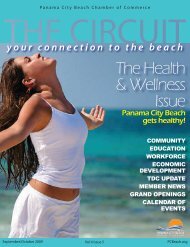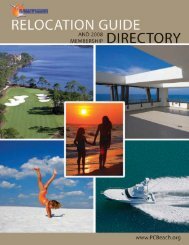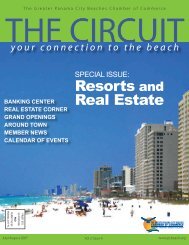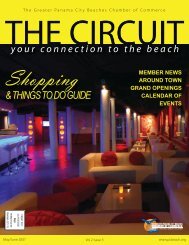View This Issue - Panama City Beach Chamber of Commerce
View This Issue - Panama City Beach Chamber of Commerce
View This Issue - Panama City Beach Chamber of Commerce
You also want an ePaper? Increase the reach of your titles
YUMPU automatically turns print PDFs into web optimized ePapers that Google loves.
9<br />
Sleep Apnea<br />
What It Means &<br />
How It Can Affect You<br />
Sleep Apnea is a sleep disorder characterized<br />
by abnormal pauses in breathing<br />
or instance <strong>of</strong> abnormally low<br />
breathing during sleep. Each pause<br />
in breathing, called an apnea, can last<br />
from a few seconds to minutes, and<br />
may occur five to 30 times or more per<br />
hour. Sleep apnea is diagnosed with<br />
an overnight sleep test called a polysomnogram,<br />
or “sleep study.”<br />
There are three forms <strong>of</strong> sleep apnea:<br />
central (CSA), obstructive (OSA) and<br />
complex or mixed sleep apnea (a<br />
combination <strong>of</strong> central and obstructive).<br />
In CSA, there is a central block<br />
and a lack <strong>of</strong> respiratory effort. In<br />
OSA, breathing is interrupted by a<br />
physical block to airflow despite respiratory<br />
effort, and snoring is common<br />
with OSA.<br />
Sleep apnea is recognized more <strong>of</strong>ten<br />
by others because rarely does the<br />
person affected by sleep apnea realize<br />
there is a problem. The symptoms<br />
Dr. William T. McKenzie, M.D. is an American Board<br />
<strong>of</strong> Internal Medicine physician, Board Certified by<br />
the ABIM in Pulmonary and Sleep Medicine.<br />
include loud snoring, excessive daytime<br />
sleepiness, depression, fatigue,<br />
reduced resistance to infection, and<br />
choking or gasping for breath.<br />
Normally, the muscles that control<br />
the tongue and s<strong>of</strong>t palate hold the<br />
airway open. When the muscles relax<br />
the airway narrows. <strong>This</strong> can lead to<br />
snoring and breathing difficulties. If<br />
the muscles relax too much, the airway<br />
can collapse and become blocked<br />
causing obstructed breathing (OSA).<br />
In recent studies, 90% <strong>of</strong> stroke victims<br />
also suffer OSA; a person with<br />
OSA is four times more likely to have<br />
a heart attack. The risk factors include<br />
stroke, diabetes, obesity, memory loss,<br />
heart disease and high blood pressure.<br />
Treatment options to relieve OSA<br />
include CPAP devices, Oral Appliance<br />
Therapy, and surgery for the more<br />
severe cases. Your physician will determine<br />
the best treatment based on<br />
your sleep study test.<br />
The Sleep Apnea Network, SleepApneaNetwork.org,<br />
is designed to keep<br />
the public informed about the symptoms,<br />
risk factors and latest alternatives<br />
to benefit persons with sleep<br />
apnea. For more information about<br />
the Sleep Apnea Network, contact Dr.<br />
William T. McKenzie at (850) 522-5864.<br />
34 THE CIRCUIT September/October 2012
















